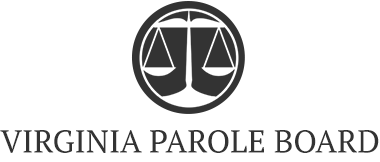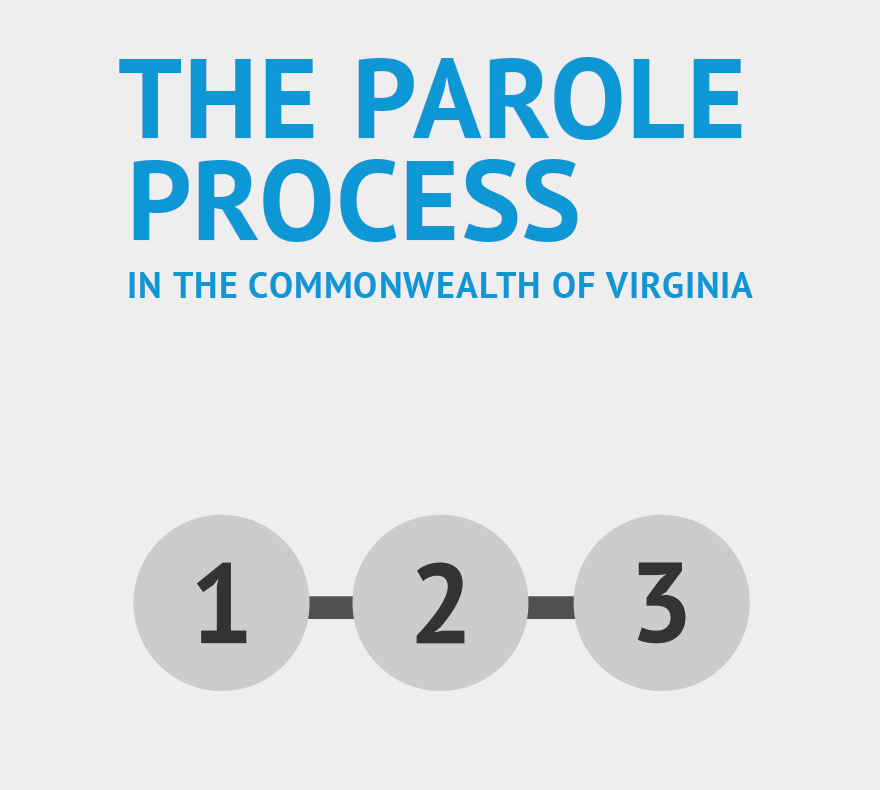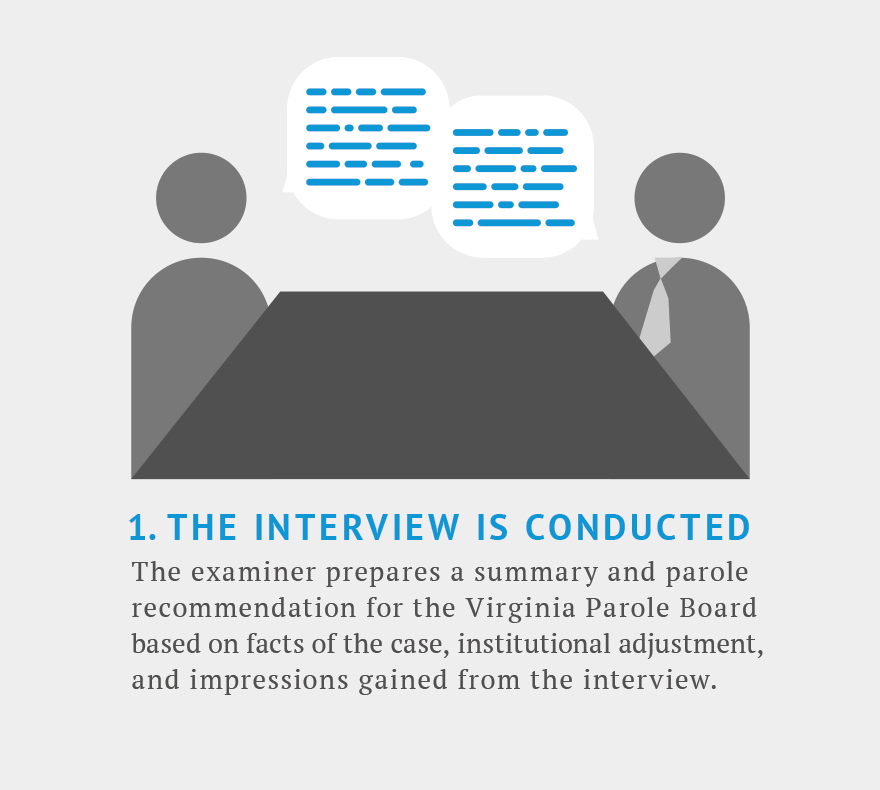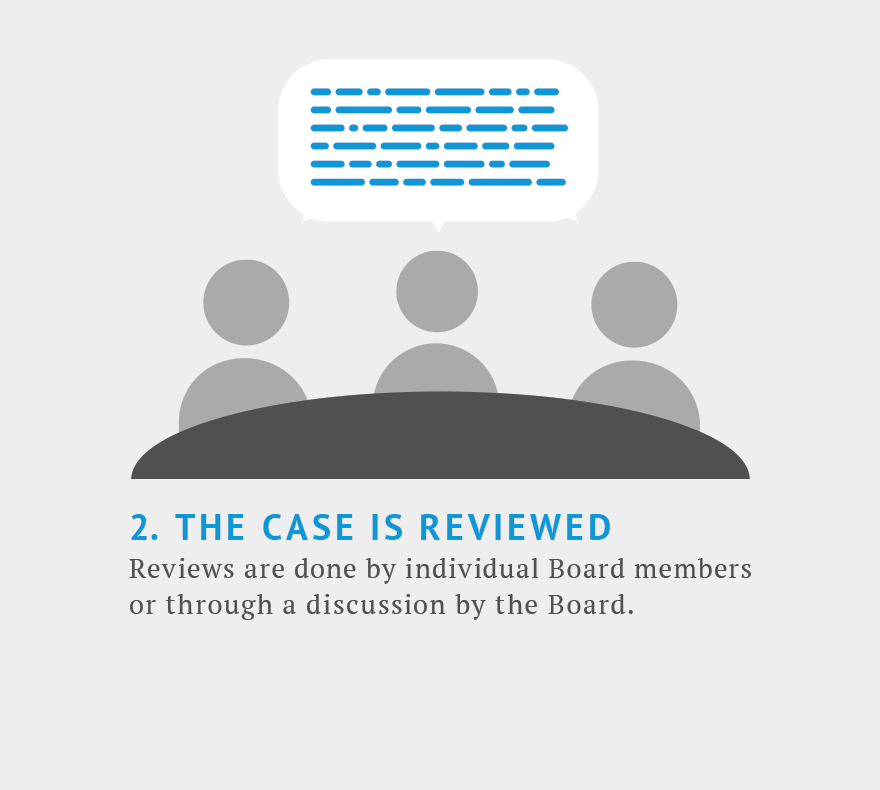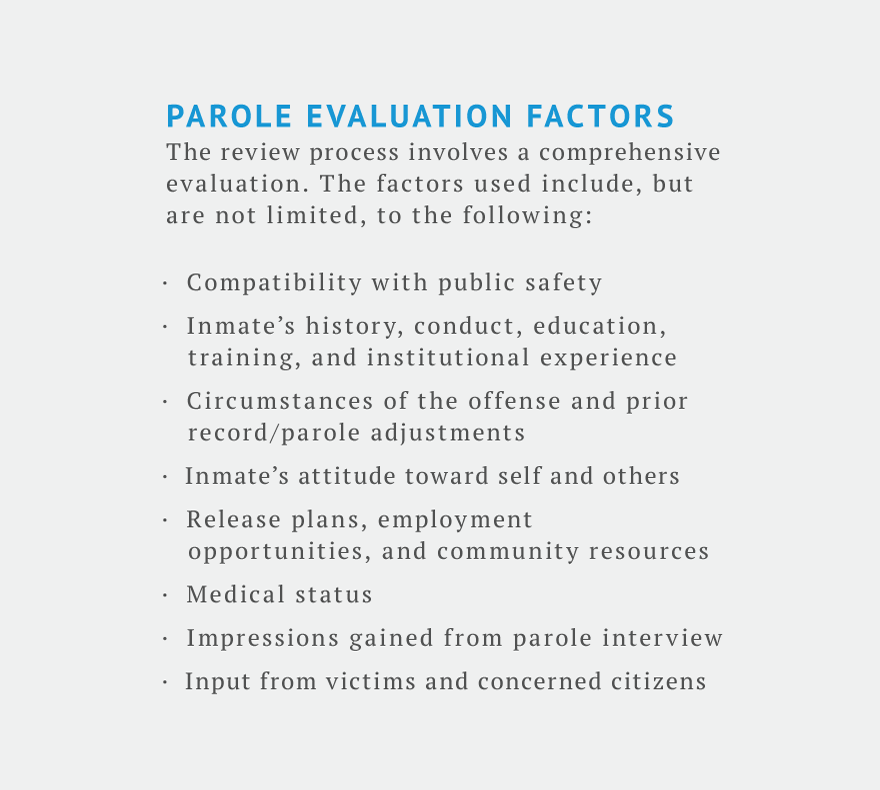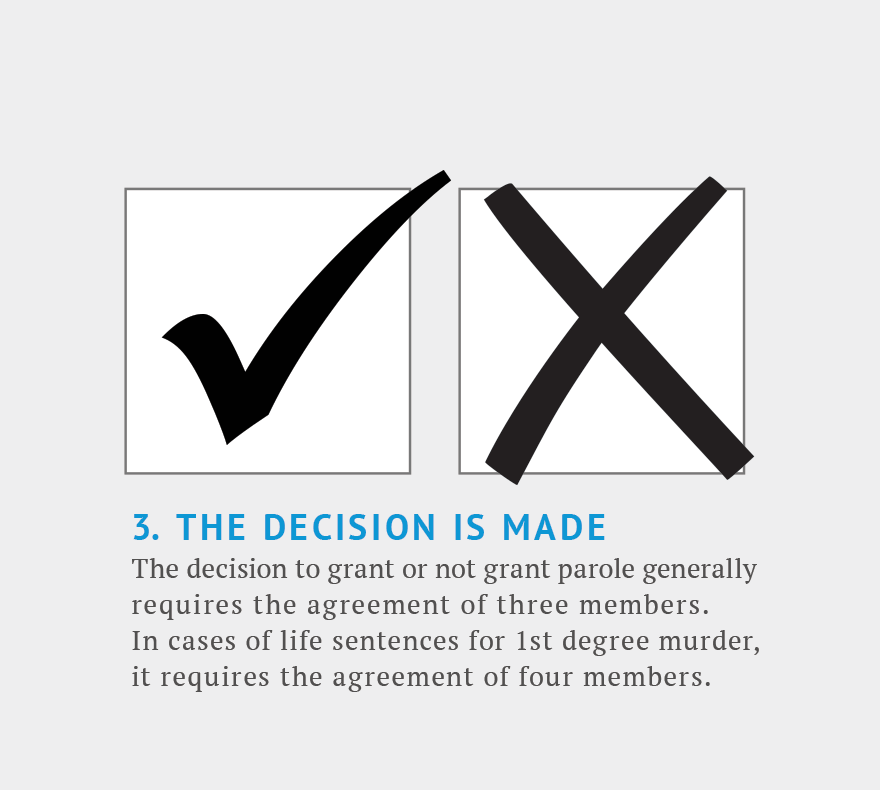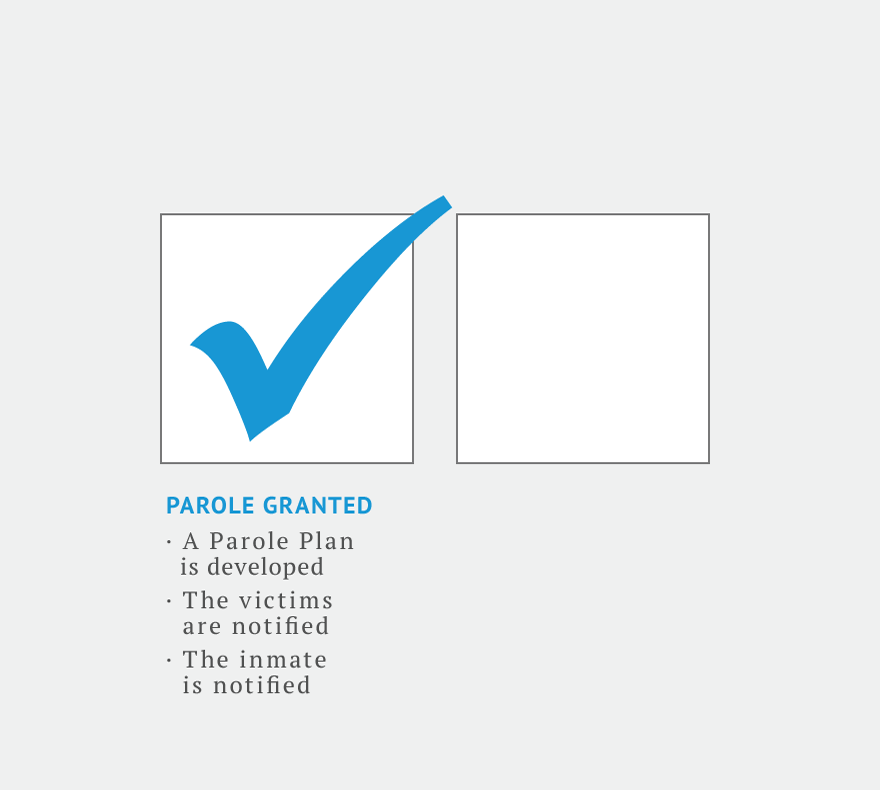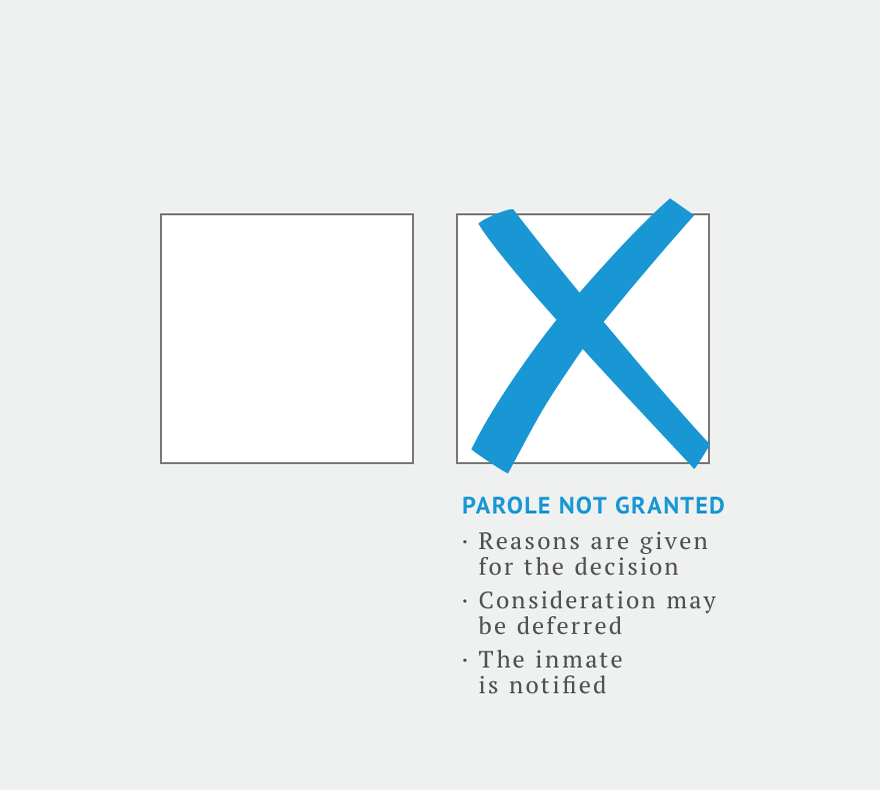About the Parole Board
The General Assembly has given the Parole Board authority to grant parole, to deny parole, to detain parole violators, and to revoke parole.
Virginia Code Section 53.1-136 empowers the Board to make the following decisions for persons who committed their crime prior to January 1, 1995:
- to conditionally release inmates who are parole eligible, and found suitable for release
- to revoke parole and post release supervision of those under supervision found to be in violation of the terms of their release, and
- to investigate, prepare reports and advise the Governor, when requested, on Executive Clemencies.
Virginia Code Section 53.1-40.01 also makes the Parole Board responsible to act on geriatric requests for conditional release.
Notwithstanding the provisions of Virginia Code Section 53.1-40.01, the Parole Board shall annually consider for conditional release those inmates who meet the criteria for conditional geriatric release set out in Virginia Code Section 53.1-40.01. If any such inmate is also eligible for discretionary parole under the provisions of Virginia Code Section 53.1-151 et seq., the board shall not be required to consider that inmate for conditional geriatric release unless the inmate petitions the board for conditional geriatric release.
Following the Board's decision to grant an inmate parole, the inmate must agree to abide by specific conditions in return for the opportunity to serve the remainder of his or her sentence under supervision in the community. This creates a contractual agreement between the Parole Board and the inmate.
Parole supervision is carried out for the Virginia Parole Board by the probation and parole officers of the Virginia Department of Corrections.
Notice
Beginning July 1, 2024, the Virginia Parole Board will only be scheduling Board appointments every two years for advocacy parties in support of an inmate’s parole/geriatric conditional release. This action is in accordance with the Parole Board’s Administrative Procedure 1.112, effective September 17, 1991 (revised September 11, 2002). This procedure is outlined in the Procedures Manual on the “About” page. The Parole Board will accept letters in support of parole/geriatric conditional release at any time. Please note that victims may schedule Board Appointments annually or as needed.
Parole Board Members
-
Honorable Judge Patricia West, Chairman
-
Lloyd Banks, Vice-Chairman
-
Michelle Dermyer, Member
-
Samuel L. Boone Jr., Member
Parole Process
The Virginia Parole Board reviews all eligible inmates. An individual is eligible for parole if he or she falls into one of the following categories:
- The individual committed the crime prior to January 1, 1995.
- The individual was sentenced by a jury prior to June 9, 2000, for any felony offense committed on or after January 1, 1995, and remained incarcerated for such offense on July 1, 2020, other than (i) a Class 1 felony or (ii) any of the following felony offenses where the victim was a minor: (a) rape in violation of §18.61; (b) forcible sodomy in violation of §18.2-67.1; (c) object sexual penetration in violation of §18.2-67.2; (d) aggravated sexual battery in violation of 18.2-67.3; (e) an attempt to commit a violation of clause (a), (b), (c), or (d); or (f) carnal knowledge in violation of §18.2-63, 18.2-64.1, or 18.2-64.2.
- The individual was sentenced to a term of life imprisonment for a single felony or multiple felonies committed while the individual was a juvenile and the individual has served at least 20 years of such sentence.
- The individual has active sentences that total more than 20 years for a single felony or multiple felonies committed while the individual was a juvenile and the individual has served at least 20 years of such sentences.
- The individual has multiple misdemeanors committed prior to July 1, 2008.
- The individual was sentenced to an indeterminate sentence under the Youthful Offender Act.
Once an inmate is eligible for parole, the parole process in Virginia goes through the three steps illustrated in the following slideshow.
Once a decision is certified, granted inmates are released according to Virginia Parole Board policy and procedures. Inmates who are denied parole receive a letter setting forth reasons for the denial.
For more information about the parole process, please see our Policy Manual and Procedures Manual.
Parole Denial Reasons
The following explanations are offered to assist in understanding the Board’s reasons for not granting parole:
- More Time to Serve
- The Board may determine an inmate should satisfy a greater portion of the sentence imposed based on the crimes) committed.
- Conviction of a New Crime while Incarcerated
- An inmate whose criminal behavior continues while incarcerated demonstrates a lack of respect for laws and a risk to the community.
- Crimes Committed
- The Board considers the nature and number of crimes committed by the inmate.
- Extensive Criminal Record
- If an inmate has multiple convictions, this signals a lengthy pattern of criminal behavior and inability to abide by the laws of the Commonwealth.
- History of Substance Abuse
- A history of drug or alcohol abuse bears upon an inmate’s ability to make rational and law-abiding decisions.
- History of Violence
- Multiple and historical violent crimes against citizens suggests the probability that an inmate will re-offend with similar violent crimes if released on parole. A violent act associated with the current incarceration may be considered a part of the inmate’s history.
- Further Participation in Institutional Work and/or Educational Programs
- This refers to inmates who are beginning to demonstrate positive changes, but the Board is still reluctant to release them. The Board is acknowledging the change and encouraging continued improvement but is looking for further participation and completion of programs.
- Poor Institutional Adjustment
- This applies to inmates who are not demonstrating an attitude or motivation toward a positive adjustment. The inmate continues to receive unfavorable reports and may not be involved in programs, etc.
- Prior Failure under Community Supervision
- This refers to an inmate’s proven inability to function in the community and to abide by the rules of supervision. It may include new criminal convictions or technical violations.
- Record of major institutional infractions - not ready to conform to society
- This refers to an inmate’s inability to follow prison rules.
- Risk to the Community
- Considering the nature of the crime(s), prior failures on supervision, and institutional adjustment, releasing an inmate on parole is not in the best interest of the community.
- Serious disregard for property rights of others
- This refers to criminal behavior that impacts the property of others.
- Serious Nature and Circumstances of the Crime
- This reflects the harm committed or caused to others, the magnitude of the crime, and its impact on the victim and community.
- Longer Period of Stable Adjustment
- The Board is recognizing an inmate is beginning to demonstrate positive changes but would like to see the inmate continue this adjustment over a longer period.
